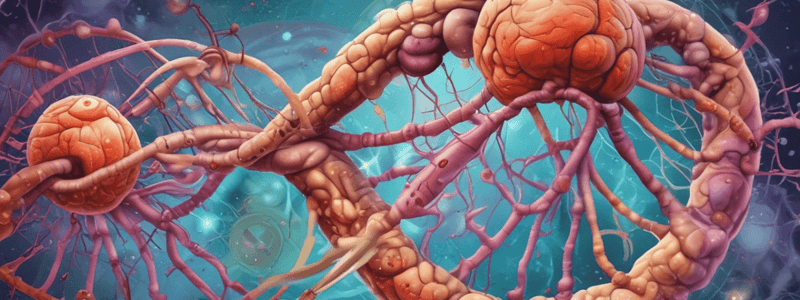Podcast
Questions and Answers
What is the cause of severe combined immune deficiency (SCID)?
What is the cause of severe combined immune deficiency (SCID)?
- Lack of T cells and B cells (correct)
- Overactive immune system
- Allergic reaction to non-threatening substances
- Genetic mutation in the FLG gene
What is the function of the MYC gene?
What is the function of the MYC gene?
- Regulation of cell division (correct)
- Production of red blood cells
- Maintenance of bone density
- Digestion of food
Which virus is linked to cervical cancer?
Which virus is linked to cervical cancer?
- HHV-8
- HTLV-1
- HPV (correct)
- HCV
What is the cause of Epidermodysplasia verruciformis?
What is the cause of Epidermodysplasia verruciformis?
What is the aim of Gardasil 9 Vaccine?
What is the aim of Gardasil 9 Vaccine?
What is the cause of atopic dermatitis, peanut allergies, asthma, and hay fever?
What is the cause of atopic dermatitis, peanut allergies, asthma, and hay fever?
What is autoimmunity?
What is autoimmunity?
Which gene increases the risk of breast, ovarian, prostate, and other cancers?
Which gene increases the risk of breast, ovarian, prostate, and other cancers?
What is the cause of APECED?
What is the cause of APECED?
What is the difference between inherited susceptibility and sporadic cancers?
What is the difference between inherited susceptibility and sporadic cancers?
Which virus is not linked to cancer?
Which virus is not linked to cancer?
What is the cause of Rh incompatibility?
What is the cause of Rh incompatibility?
Study Notes
- Karyotypes can show chromosomal abnormalities.
- Blood type can influence an immune response.
- Rh incompatibility can cause infant mortality rates to decline.
- The immune system has innate and adaptive immunity.
- Severe combined immune deficiency (SCID) is a disorder with no T cells or B cells.
- Allergies are immune system responses to non-threatening substances.
- Mutations in the FLG gene can cause atopic dermatitis, peanut allergies, asthma, and hay fever.
- Autoimmunity occurs when the immune system attacks the body's own tissues.
- APECED is a rare genetic disorder characterized by autoimmune problems.
- Skewed X inactivation may explain why some autoimmune disorders are more common in females.
- Mutations in BRCA2 gene increase risk of breast, ovarian, prostate, and other cancers.
- BRCA2 is a gene on chromosome 13.
- 7 viruses are linked to cancer, including HPV, EBV, HBV, HCV, HIV, HHV-8, and HTLV-1.
- Merkel cell polyomavirus is also linked to cancer.
- Epstein-Barr virus can cause MYC gene mutation.
- MYC regulates cell division.
- Retroviruses can cause cancer.
- Human papillomavirus is a sexually transmitted virus linked to cervical cancer.
- Certain mutations in BRCA2 gene increase risk of cancer.
- Epstein-Barr virus can lead to MYC gene mutation.
- Gardasil 9 Vaccine can protect against 9 strains of HPV virus.
- The aim is to identify factors that can lead to the development of cancer.
- Ways to protect oneself against cancers caused by viruses are discussed.
- The man in the text has Epidermodysplasia verruciformis caused by a mutation on two genes on chromosome 17.
- Driver mutations provide the selective growth advantage to a cell that defines the cancerous state.
- Cancers can be caused by inherited mutations, environmental exposures, toxic substances, UV radiation, and viral exposure.
- Groups of three are tasked with creating a claim regarding whether vaping increases the risk of lung cancer.
- The text discusses genetics and disease, including abnormal karyotypes, human syndromes, immune system disorders, and genetic changes in cancer cells.
- Inherited susceptibility and sporadic cancers are distinguished.
- Potential contributing factors in cancer, such as colon and lung cancer, are named and described.
Studying That Suits You
Use AI to generate personalized quizzes and flashcards to suit your learning preferences.
Description
Test your knowledge on genetics, immunity, and cancer with this quiz covering topics such as karyotypes, blood types, immune system responses, chromosomal abnormalities, gene mutations, viruses linked to cancer, autoimmune disorders, and factors contributing to cancer development.




